- Home
- Terry Brooks
[Magic Kingdom of Landover 05] - Witches' Brew
[Magic Kingdom of Landover 05] - Witches' Brew Read online
ANOTHER TIME,
ANOTHER PLACE
The iron-bound oaken door flew inward, splintering into shards that barely managed to hang together from the shattered bindings. Something huge and dark filled the doorway, tearing at the stone walls that hindered its passage into the bedchamber.
Lightning flashed and lit up the monstrous apparition as Ben and Willow stared in disbelief. It was a giant encased in metal from head to foot. Bunion clung to the creature, ripping at it with teeth and claws, but the thing didn’t even seem to notice the kobald.
My God, Ben thought, it’s a robot!
A Del Rey® Book
Published by The Random House Publishing Group
Copyright © 1995 by Terry Brooks
Excerpt from First King of Shannara copyright © 1996 by Terry Brooks
All rights reserved under International and Pan-American Copyright Conventions. Published in the United States by The Random House Publishing Group, a division of Random House, Inc., New York, and simultaneously in Canada by Random House of Canada Limited, Toronto.
This book contains an excerpt from the hardcover edition of First King of Shannara by Terry Brooks. This excerpt has been specially set for this edition only and may not reflect the final content of the hardcover edition.
Del Rey is a registered trademark and the Del Rey colophon is a trademark of Random House, Inc.
www.delreybooks.com
Library of Congress Catalog Card Number: 95-92517
eISBN: 978-0-307-57089-5
v3.1_r2
All children, except one, grow up. They soon know that they will grow up, and the way Wendy knew was this. One day when she was two years old she was playing in a garden, and she plucked another flower and ran with it to her mother. I suppose she must have looked rather delightful, for Mrs. Darling put her hand to her heart and cried, “Oh, why can’t you remain like this for ever!” This was all that passed between them on the subject, but henceforth Wendy knew that she must grow up. You always know after you are two. Two is the beginning of the end.
J. M. Barrie, Peter Pan
Contents
Cover
Title Page
Copyright
Epigraph
Mistaya
Rydall of Marnhull
Haltwhistle
Spell Cast
Challenge
Seduction
Bumbershoot
Graum Wythe Redux
What You See
Ardsheal
Nightshade’s Tale
Juggernaut
Dragon Sight
Wurm
Poggwydd
Concealments
Specter
Dog Dreams
Venom
Holiday Heart
Specimen
Dedication
Except from FIRST KING OF SHANNARA
Other Books by This Author
About the Author
Mistaya
The crow with the red eyes sat on a branch in the towering old white oak where the leafy boughs were thickest and stared down at the people gathered for their picnic in the sunny clearing below. That was what Holiday called it, a picnic. A brightly colored cloth was spread out on the lush spring grass, and the contents of several baskets of food were being emptied onto it. The food, if you were human and possessed of an appetite, would have pleased and delighted, the crow supposed. There were platters of meats and cheeses, bowls of salad and fruit, loaves of bread, and flasks of ale and chilled water. There were plates and napkins set around for each participant and cups for drinking and utensils for eating. A vase of wildflowers had been placed at the center of the feast.
Willow was doing most of the work, the sylph with the emerald tresses and small, lithe form. She was animated, laughing and talking with the others as she worked. The dog and the kobold helped her: Abernathy, who was Landover’s Court Scribe, and Parsnip, who did most of the castle’s cooking. Questor Thews, the ragtag white-bearded wizard, wandered about looking in amazement at sprigs of new growth and strange wildflowers. Bunion, the other kobold, the dangerous one, the one who could spy out almost anything, patrolled the clearing’s perimeter, ever watchful.
The King sat alone at one end of the bright cloth. Ben Holiday, High Lord of Landover. He was staring out into the trees, lost in thought. The picnic was his invention, something they did in the world from which he came. He was introducing it to the others, giving them a new experience. They seemed to be enjoying it more than he was.
The crow with the red eyes sat perfectly still within the concealment of the branches of the old oak, cognizant of the adults but really interested only in the child. Other birds, some more dazzling in their plumage, some more sweet with their song, darted through the surrounding woods, flitting from here to there and back again, mindless and carefree. They were bold and heedless; the crow was purposefully invisible. No eye but the child’s would be cast; no attention but the child’s would be drawn. The crow had been waiting more than an hour for the child to notice it, for its unspoken summons to be heeded, for its silent command to be obeyed, and for the brilliant green eyes to be drawn upward into the leafy shadows. The child was walking about, playing at this and that, seemingly aimless but already searching.
Patience, then, the crow with the red eyes admonished. As with so much in life, patience.
Then the child was directly below, the small face lifting, the dazzling green eyes seeking and abruptly finding. The child’s eyes locked on the crow’s, emerald to crimson, human to bird. Words passed between them that did not need speaking, a silent exchange of thoughts on being and having, on want and loss, on the power of knowledge and the inexorable need to grow. The child stood as still as stone, staring up, and knew there was something vast and wondrous to be learned if the proper teacher could be found.
The crow with the red eyes intended to be that teacher.
The crow was the witch Nightshade.
Ben Holiday leaned back on his elbows and let the smells of the picnic lunch bring a growl to his empty stomach. Breakfast had been hours ago, and he had been careful to refrain from eating anything since. Thank goodness the wait was almost over. Willow was unpacking the containers and setting them out, aided by Abernathy and Parsnip. Soon it would be time to eat. It was a perfect summer day for a picnic, the sky clear and blue, the sun warming the earth and the new grasses, chasing memories of winter’s chill into the past once more. Flowers were blooming, and leaves were thick again in the trees. The days were stretching out farther as midsummer neared, and Landover’s colored moons were chasing each other for increasingly shorter periods of time across the darkened heavens.
Willow caught his eye and smiled at him, and he was instantly in love with her all over again, as if it were the first time. As if they were meeting in the midnight waters of the Irrylyn and she was telling him how they were meant for each other.
“You might lend a hand, wizard,” Abernathy snapped at Questor Thews, interrupting Ben’s thoughts, obviously peeved that the other was doing none of the work in setting out the lunch.
“Hmmm?” Questor looked up from a strange purple and yellow wildflower, oblivious. The wizard always looked as if he were oblivious, whether in fact he was or not.
“Lend a hand!” Abernathy repeated sharply. “Those who don’t do the work don’t eat the food—isn’t that how the fable goes?”
“Well, no need to get huffy about it!” Questor Thews abandoned his study for the more pressing need of appeasing his friend. “Here, that’s not the way to do that! Let me show you.”
They went back and forth for a few more moments, then Willow
intervened, and they settled down. Ben shook his head. How many years now had they been going at each other like that? Ever since the wizard had changed the scribe into a dog? Even before? Ben wasn’t sure, in part because he was the newcomer to the group and the history wasn’t entirely clear even now and in part because time had lost meaning for him since his arrival from Earth. Assuming a separateness of Landover from Earth, he amended, an assumption that was perhaps more theoretical than factual. How, after all, did you define a boundary that was marked not by geographical landmarks or proper surveys but by fairy mists? How did you differentiate between soils that could be crossed in a single step, but not without words or talismans of magic? Landover was here and Earth there, pointing right and left, but that didn’t begin to explain the distance between them.
Ben Holiday had come into Landover when his hopes and dreams for a life in his old world had dried to dust, and reason had given way to desperation. Purchase a magic kingdom and find a new life, the ad in Rosen’s Christmas catalogue had promised. Make yourself King of a land where the stories of childhood are real. The idea was unbelievable and at the same time irresistible. It called for a supreme act of faith, and Ben had heeded that call in the manner of a drowning man reaching for a lifeline. He had made the purchase and crossed into the unknown. He had come to a place that couldn’t possibly exist and had found that it did. Landover had been everything and nothing like what he had expected. It had challenged him as he had not thought anything could. But ultimately it had given him what he needed: a new beginning, a new chance, a new life. It had captured his imagination. It had transformed him completely.
It continued to baffle him, though. He was still trying to understand its nuances. Like this business of time’s passage. It was different here from his old world; he knew that from having crossed back and forth on more than one occasion and finding seasons out of synch. He knew it, too, from the effect it had on him—or the lack thereof. Something was different in the way he aged over here. It was not a progressive process, a steady rate of change, minute by minute, hour by hour, and so forth. It was difficult to believe, but sometimes he did not age at all. He had only suspected that before, but he was certain of it now. This was a deduction arrived at not from observing his own rate of growth, which was not easily measured because he lacked objectivity and distance.
No, it was from observing Mistaya.
He looked over for her. She stood in front of a massive old white oak, staring upward into its branches, her gaze intense. His brow furrowed as he watched her. If there was one word he would use to describe his daughter, that was probably it. “Intense.” She approached everything with the single-mindedness of a hawk in search of prey. No lapses in concentration or distractions were allowed. When she focused on something, she gave it her complete attention. Her memory was prodigious and perhaps required that she study a thing until it was hers. It was strange behavior in a small child. But then, Mistaya herself was strange.
There was the question of her age. It was from this, from his study of her rate of growth, that Ben was able to see more clearly that his suspicions about himself were not unfounded. Mistaya had been born two years ago, measured by the passing of Landover’s seasons, the same four seasons that Earth saw in a year’s time. That should have made her two years old. But it didn’t. Because she wasn’t anywhere close to two years old. She seemed almost ten. She had been two years old when she was two months old. She was growing quite literally by leaps and bounds. In only months she grew years. And she didn’t do it in a logically progressive fashion, either. For a time she would not grow at all—at least, not noticeably. Then, she would age months or even an entire year overnight. She would grow physically, mentally, socially, emotionally, in every measurable way. Not altogether or even at the same rate, but on a general scale one characteristic would eventually catch up with the others. She seemed to mature mentally first; yes, he was convinced of that much. She had been talking, after all, when she was three. That was months, not years. Talking as if she were maybe eight or nine. Now, at two years or ten years or whatever standard of reference you cared to use, she was talking as if she were twenty-five.
Mistaya. The name had been Willow’s choice. Ben had liked it right from the first. Mistaya. Misty Holiday. He thought it a nice play on words. It suggested sweetness and nostalgia and pleasant memories. It fit the way she had looked when he had first seen her. He had just escaped from the Tangle Box; she and her mother had escaped from the Deep Fell, where Mistaya had been born. Willow would not talk about the birthing at first, but then, they had both harbored secrets that needed revealing if they were to stay true to each other, and in the end they had both confessed. He had told her of Nightshade as the Lady; she had told him of Mistaya. It had been difficult but healing. Willow had dealt better with Ben’s truth than he had with hers. Mistaya might have been anything, given the nature of her birth. Born of a tree as a seedling, nourished by soils from Earth, Landover, and the fairy mists, come into being in the dank, misty deadness of the Deep Fell, Mistaya was an amalgam of worlds, magics, and bloods. But there she was that first time he had seen her, lying in the makeshift coverings, a perfect, beautiful baby girl. Dazzling green eyes that cut to your soul, clear pink skin, honey-blond hair, and features that were an instantly recognizable mix of Ben’s and Willow’s own.
Ben had thought from the first that it was all too good to be true. He began to discover soon enough that he was right.
He watched Mistaya shoot through infancy in a matter of several months. He watched her take her first steps and learn to swim in the same week. She began talking and running at the same time. She mastered reading and elementary math before she was a year old. By then his mind was reeling at the prospect of being parent to a phenomenally advanced child, a genius the like of which no one in his old world had ever seen. But even that didn’t turn out the way he had expected. She matured, but never as rapidly in any one direction as he anticipated. She would advance to a certain point and then simply stop growing. For instance, after she mastered rudimentary math, she lost interest entirely in the subject. She learned to read and write but never did anything more with either. She seemed to delight in hopping from one new thing to the next, and there was never any rational explanation for why she progressed as far as she did and no farther.
She evidenced no interest in childish pursuits, not once, not from day one. Playing with dolls or toys, throwing and catching a ball, and jumping rope were for other children. Mistaya wanted to know how things worked, why they happened, and what they meant. Nature fascinated her. She took long walks, much longer than Ben would have thought physically possible for a child so young, all the time studying everything around her, asking questions about this and that, storing everything away in the drawers and closets of her mind. Once, when she was very young, only a few months old and just learning to talk, he found her with a rag doll. He thought for just an instant that she might be playing with it, but then she looked at him and asked in that serious voice and with those intense eyes why the maker of the doll had chosen a particular stitching to secure its limbs.
That was Mistaya. Right to the point and dead serious. She called him “Father” when she addressed him. Never “Dad” or “Daddy” or some such. “Father.” Or “Mother.” Polite but formal. The questions she asked were serious, important ones in her mind, and she did not treat them lightly. Ben learned not to do so, either. When once he laughed at something she had said that struck him funny, she gave him a look that suggested that he ought to grow up. It wasn’t that she couldn’t laugh or find humor in her life; it was that she was very particular about what she found funny and what not. Abernathy made her laugh frequently. She teased him unmercifully, always quite serious as if not intending to put him on at all, then breaking into a sudden grin just as he caught on to what was happening. He bore this with surprisingly good humor. When she was very small, she used to ride him about and tug on his ears. She was not mean about it, only playf
ul. Abernathy would not have tolerated this from another living soul. With Mistaya, he actually seemed to enjoy it.
For the most part, however, she found grown-ups dull and restrictive. She did not appreciate their efforts to govern and protect her. She did not respond well to the word “no” or to the limitations that her parents and advisors placed on her. Abernathy was her tutor, but he confessed in private that his prize student was frequently bored by her lessons. Bunion was her protector, but after she learned to walk he was hard pressed to keep her in sight much of the time. She loved and was affectionate toward Ben and Willow, though in that strange, reserved way she cultivated. At the same time she clearly thought them mired in conventions and attitudes that had no place in her life. She had a way of looking at them when they were offering an explanation that suggested quite clearly that they didn’t understand the first thing about her, because if they did, they wouldn’t be wasting their time.
Adults were a necessary evil in her young life, she seemed to believe, and the sooner she was fully grown, the better. That might explain why she had aged ten years in two, Ben often thought. It might explain why, almost from the time she began to talk, she addressed all adults in an adult manner, using complete sentences and proper grammar. She could pick up a speech pattern and memorize it in a single sitting. Now, when Ben conversed with her, it was like carrying on a conversation with himself. She spoke to him in exactly the same way he spoke to her. He quickly abandoned any attempt at addressing her as he might a normal child or—God forbid—talking down to her as if she might not otherwise pay attention. If you talked down to Mistaya, she talked down to you right back. With his daughter there was a serious question as to who was the adult and who the child.
The one exception to all this child and adult business was Questor Thews. The relationship she shared with the wizard was entirely different from the ones she shared with other adults, her parents included. With Questor, Mistaya seemed quite content to be a child. She did not talk to him as she did to Ben, for instance. She listened carefully to everything he said, paid close attention to everything he did, and in general seemed content with the idea that he was in some way her superior. They shared the kind of relationship granddaughters and grandfathers sometimes share. Ben thought it was mostly the wizard’s magic that bound the two. Mistaya was fascinated by it even when it didn’t work the way in which Questor intended, which was all too frequently. Questor was always showing her some little bit of sorcery, trying out something new, experimenting with this and that. He was careful not to try anything dangerous when Mistaya was around: Even so, she would follow him about or sit with him for hours on the chance that he might give her a little glimpse of the power he possessed.

 The Talismans of Shannara
The Talismans of Shannara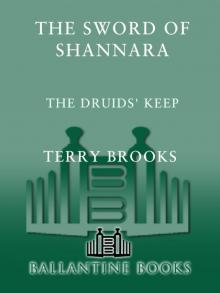 The Sword of Shannara: The Druids' Keep: The Druids' Keep
The Sword of Shannara: The Druids' Keep: The Druids' Keep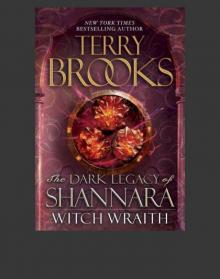 Witch Wraith
Witch Wraith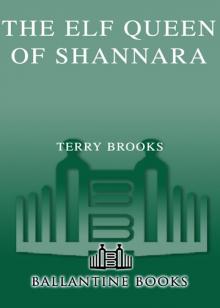 The Elf Queen of Shannara
The Elf Queen of Shannara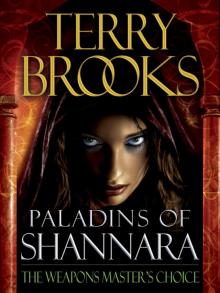 The Weapons Master's Choice
The Weapons Master's Choice The Scions of Shannara
The Scions of Shannara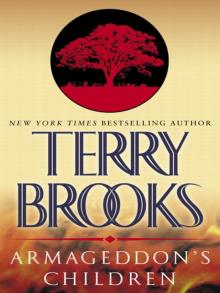 Armageddon's Children
Armageddon's Children The Sword of Shannara Trilogy the Sword of Shannara Trilogy
The Sword of Shannara Trilogy the Sword of Shannara Trilogy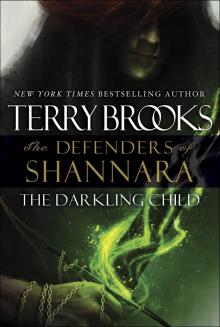 The Darkling Child
The Darkling Child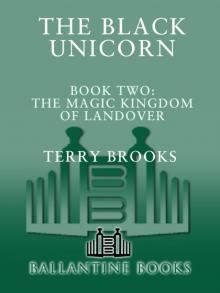 The Black Unicorn
The Black Unicorn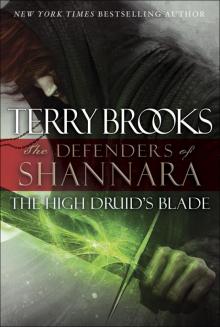 The High Druid's Blade
The High Druid's Blade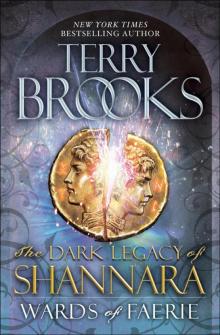 Wards of Faerie
Wards of Faerie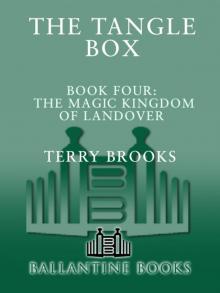 The Tangle Box
The Tangle Box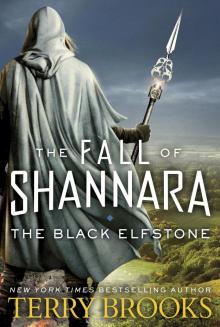 The Black Elfstone
The Black Elfstone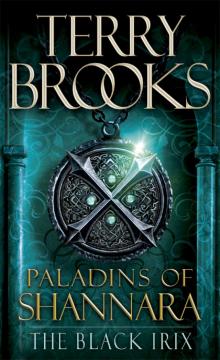 The Black Irix
The Black Irix The Elfstones of Shannara
The Elfstones of Shannara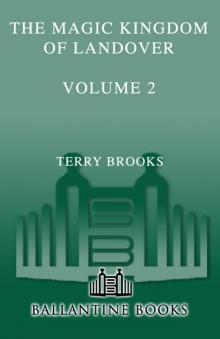 The Magic Kingdom of Landover Volume 2
The Magic Kingdom of Landover Volume 2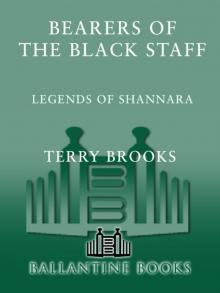 Bearers of the Black Staff
Bearers of the Black Staff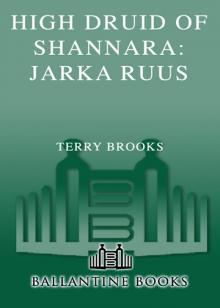 Jarka Ruus
Jarka Ruus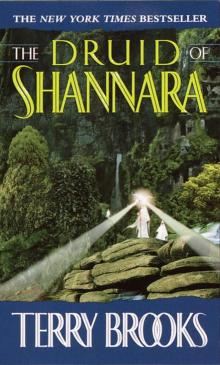 The Druid of Shannara
The Druid of Shannara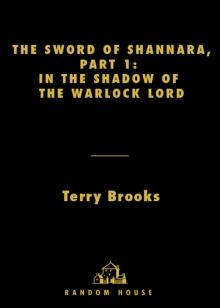 The Sword of Shannara
The Sword of Shannara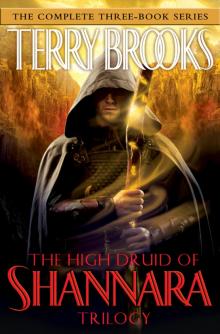 The High Druid of Shannara Trilogy
The High Druid of Shannara Trilogy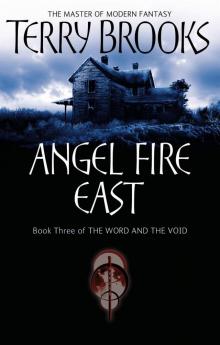 Angel Fire East
Angel Fire East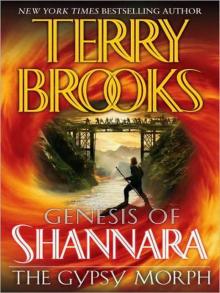 The Gypsy Morph
The Gypsy Morph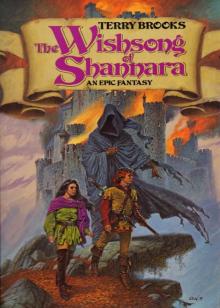 The Wishsong of Shannara
The Wishsong of Shannara Magic Kingdom for Sale--Sold
Magic Kingdom for Sale--Sold Running With the Demon
Running With the Demon Wizard at Large
Wizard at Large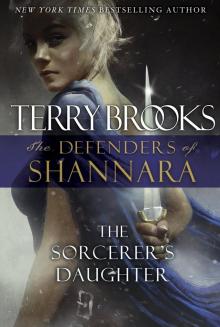 The Sorcerer's Daughter
The Sorcerer's Daughter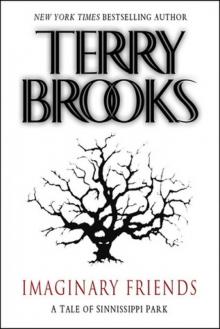 Imaginary Friends
Imaginary Friends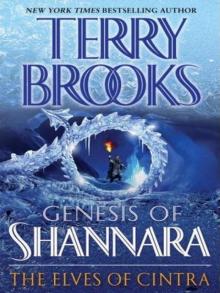 The Elves of Cintra
The Elves of Cintra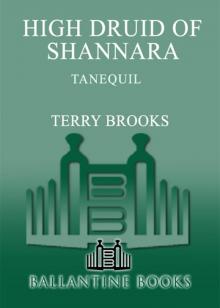 Tanequil
Tanequil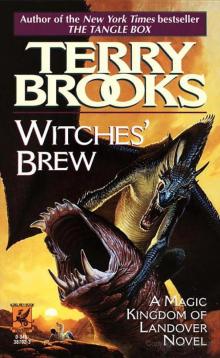 Witches' Brew
Witches' Brew The Sword of the Shannara and the Elfstones of Shannara
The Sword of the Shannara and the Elfstones of Shannara The World of Shannara
The World of Shannara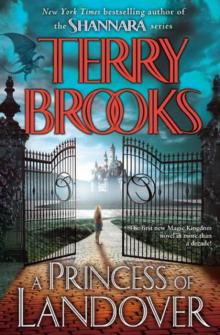 A Princess of Landover
A Princess of Landover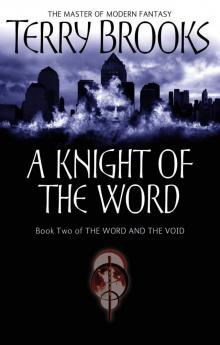 A Knight of the Word
A Knight of the Word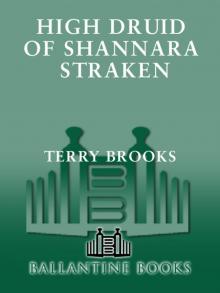 Straken
Straken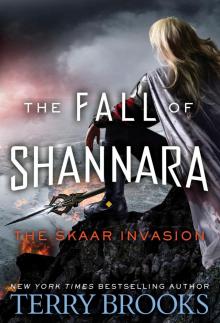 The Skaar Invasion
The Skaar Invasion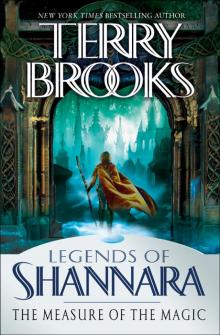 The Measure of the Magic: Legends of Shannara
The Measure of the Magic: Legends of Shannara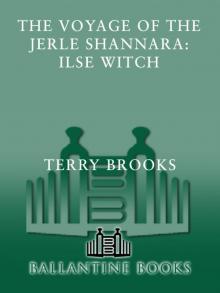 Ilse Witch
Ilse Witch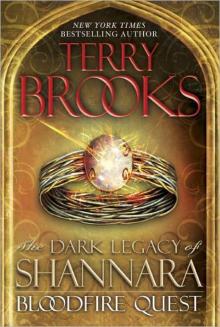 Bloodfire Quest
Bloodfire Quest The Stiehl Assassin
The Stiehl Assassin Antrax
Antrax The Last Druid
The Last Druid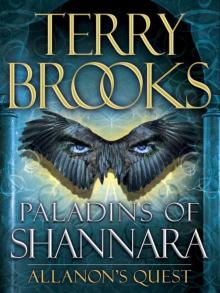 Paladins of Shannara: Allanon's Quest
Paladins of Shannara: Allanon's Quest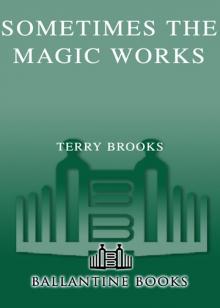 Sometimes the Magic Works: Lessons From a Writing Life
Sometimes the Magic Works: Lessons From a Writing Life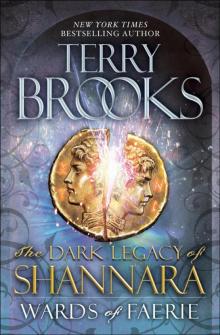 Wards of Faerie: The Dark Legacy of Shannara
Wards of Faerie: The Dark Legacy of Shannara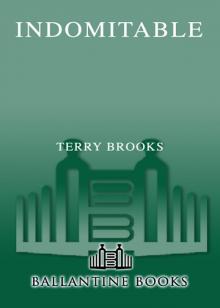 Indomitable: The Epilogue to The Wishsong of Shannara
Indomitable: The Epilogue to The Wishsong of Shannara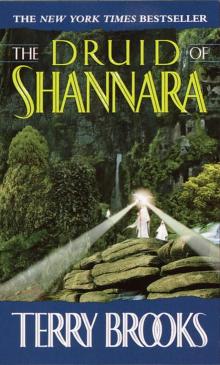 Heritage of Shannara 01 - The Druid of Shannara
Heritage of Shannara 01 - The Druid of Shannara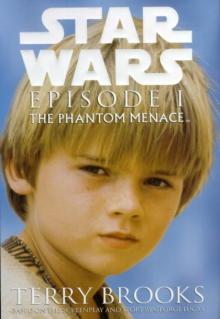 Star Wars - Phantom Menace
Star Wars - Phantom Menace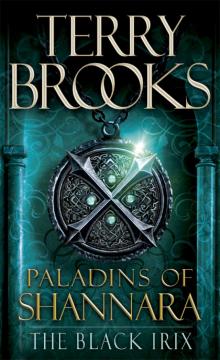 The Dark Legacy of Shannara Trilogy 3-Book Bundle
The Dark Legacy of Shannara Trilogy 3-Book Bundle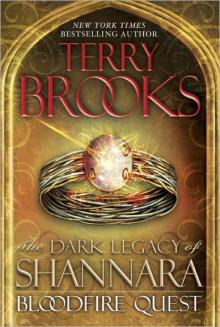 The Bloodfire Quest
The Bloodfire Quest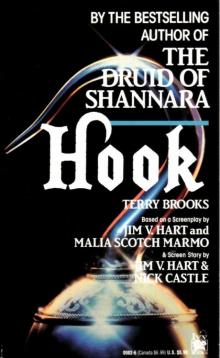 The Hook (1991)
The Hook (1991) Star Wars: Episode I: The Phantom Menace
Star Wars: Episode I: The Phantom Menace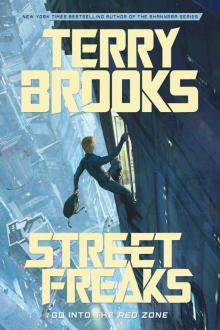 Street Freaks
Street Freaks The Sword of Shannara & Elfstones of Shannara
The Sword of Shannara & Elfstones of Shannara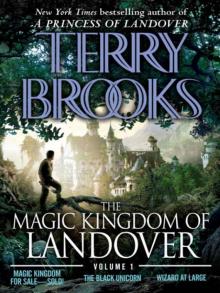 The Magic Kingdom of Landover , Volume 1
The Magic Kingdom of Landover , Volume 1 The Phantom Menace
The Phantom Menace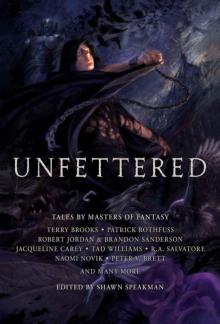 Unfettered
Unfettered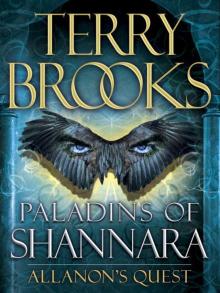 Allanon's Quest
Allanon's Quest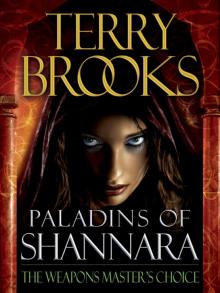 Paladins of Shannara: The Weapons Master's Choice
Paladins of Shannara: The Weapons Master's Choice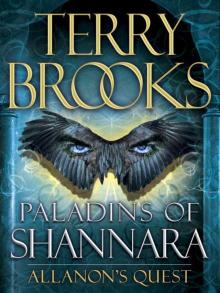 Terry Brooks - Paladins of Shannara - Allanon's Quest (Short Story)
Terry Brooks - Paladins of Shannara - Allanon's Quest (Short Story) Star Wars Episode I: The Phantom Menace (star wars)
Star Wars Episode I: The Phantom Menace (star wars)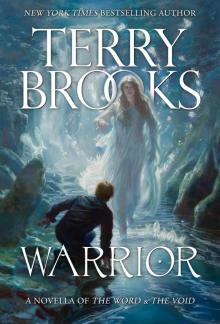 Warrior (The Word and the Void)
Warrior (The Word and the Void)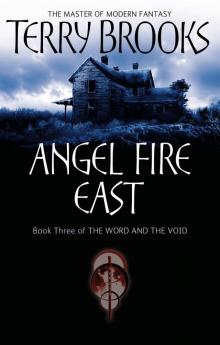 Word & Void 03 - Angel Fire East
Word & Void 03 - Angel Fire East![[Magic Kingdom of Landover 05] - Witches' Brew Read online](http://i1.bookreadfree.com/i2/04/05/magic_kingdom_of_landover_05_-_witches_brew_preview.jpg) [Magic Kingdom of Landover 05] - Witches' Brew
[Magic Kingdom of Landover 05] - Witches' Brew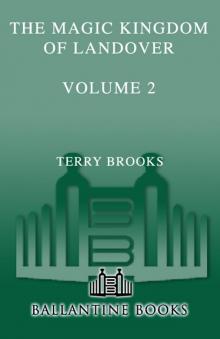 The Magic Kingdom of Landover - Volume 2
The Magic Kingdom of Landover - Volume 2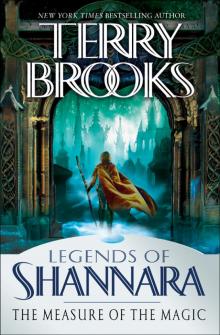 The Measure of the Magic
The Measure of the Magic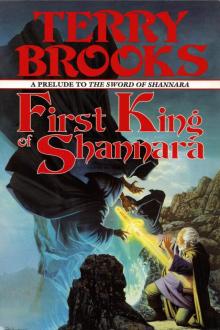 The First King of Shannara
The First King of Shannara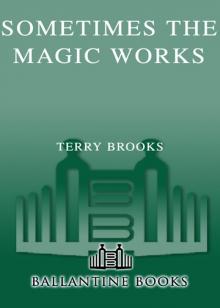 Sometimes the Magic Works
Sometimes the Magic Works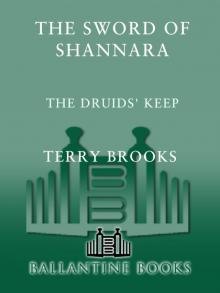 The Sword of Shannara, Part 2: The Druids' Keep
The Sword of Shannara, Part 2: The Druids' Keep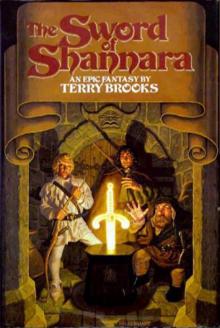 The Sword of Shannara tost-1
The Sword of Shannara tost-1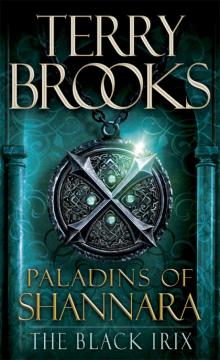 Paladins of Shannara: The Black Irix (Short Story)
Paladins of Shannara: The Black Irix (Short Story)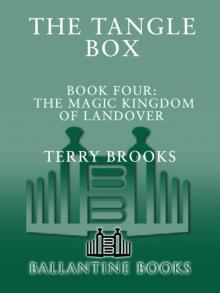 Tangle Box
Tangle Box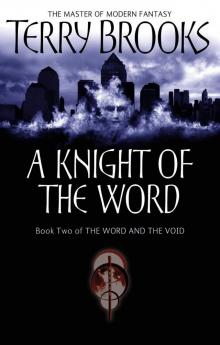 Word & Void 02 - A Knight of the Word
Word & Void 02 - A Knight of the Word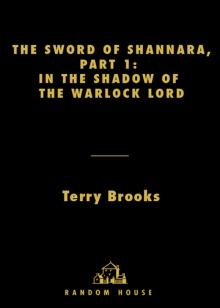 The Sword of Shannara, Part 1: In the Shadow of the Warlock Lord
The Sword of Shannara, Part 1: In the Shadow of the Warlock Lord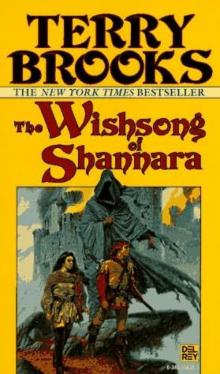 The Wishsong of Shannara tost-3
The Wishsong of Shannara tost-3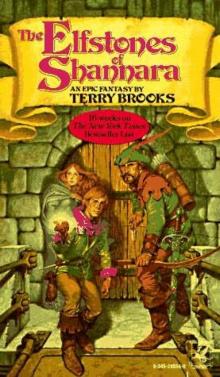 The Elfstones of Shannara tost-2
The Elfstones of Shannara tost-2